|

Law
School Satisfies Student Cravings With New Amenities
| Government
Procurement Colloquium Discusses Evolving Issue
| Paddock Named
Environmental Dean | Research
Team Says “Social Contract” Needed
to Combat AIDS | Showing
Their Service Pride | Bazos
Receives Roger Boyd Scholar Award | Frederick
Douglass Awards Gala | Human
Rights Clinic Supports ex-Peruvian Leader’s
Extradition | Triple
Play | GW
Grads Popular Among Big Firms | Lawyers
Have Heart 10K Run / 3K Fun Walk GW
hosts “San Francisco on the Potomac”
| International
Update | Faculty
File
Law School Satisfies
Student Cravings With New Amenities

The UpTowner Café, open 8 a.m. to
8 p.m., is a convenient snack shop.
Claire Duggan
|

|
Looking to enhance student life, the Law School
recently opened a food store and an upscale student
conference center as part of its seven-year renovation
plan.
Caffeine-weary students can now get their java
fix just a few doors down from class at The UpTowner
Café, GW Law’s premier food venue
that opened in January on the first floor of Lisner
Hall. The small deli-style shop offers a full
coffee station and dishes out sushi, pastries,
salads, sandwiches, and snacks from 8 a.m. to
8 p.m., serving as a convenient stop for the early-riser
or the night student.
Senior Associate Dean Thomas A. Morrison says
the plans have been in the works for several years
and came into fruition with the school’s
extension to Lisner Hall last winter.
“We expanded, we built student space, and
we wanted to bring that sense of community to
the school,” Morrison says.
Students can linger with their latte at the café
tables or grab a cup of joe to go. The shop also
offers a tasty pre-exam favorite: the Dean Morrison
sandwich, featuring turkey, pastrami, Swiss cheese,
and spring mix piled onto rye bread with honey
Dijon.
“I’m definitely a fan,” says
Morrison, who spearheaded the negotiations for
the food site.

|
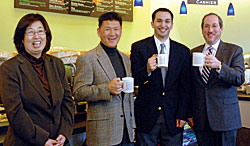
UpTowner Café
owners Eunjoo Park and Paul Park share a
cup of joe with SBA President Sam Jammal
and Dean Frederick M. Lawrence.
Claire Duggan
|
Law students are also getting use out of the
new student conference center on the second floor
of Lisner Hall. The center includes drop-down
screens, projectors, and microphones for working
conferences, and cherry wood tables and chairs
for receptions. The space was modeled after the
Michael K. Young Faculty Conference Center, which
was increasingly booked during the academic year,
Morrison says. It opened last fall.
“These venues really will change the Law
School. We now have a campus,” says Sam
Jammal, president of the Student Bar Association
for the 2006-07 academic year. “Aside from
easing some of the crowding on the lounges, they
offer new places to study and socialize. I think
we will start seeing the life of the school shift
more toward Lisner with each new class.”
In yet another first, the Law School has taken
over The Aston, a 116-unit residential building,
to offer as housing for mostly first-year students
as early as fall 2008 after a yearlong renovation
is complete.
The building is located just six blocks from
the Law School at 1129 New Hampshire Ave., N.W.,
and has one-person efficiency apartments furnished
with a twin bed, kitchen, closet and drawer space,
and wall-to-wall carpeting.
The building, a former undergraduate dorm, is
the only residence hall on campus exclusively
reserved for law students. Morrison says the housing
will be a major advantage to attracting students
from around the world.
“Not having to fight the D.C. housing market
is a big plus,” he says.
All of the utilities, including electricity,
water, gas, cable television, high-speed Internet
access, and individual phone lines are also included.
Morrison says renovations are planned during the
summer months over the next three years.
—Jaime Ciavarra

Government Procurement
Colloquium Discusses Evolving Issue
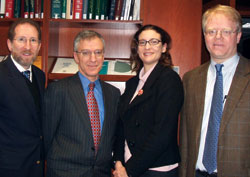
Senior Associate Dean Steven L. Schooner;
Adjunct Professor and Deputy General Counsel
of the U.S. Government Accountability Office
Daniel I. Gordon; featured speaker and University
of Paris Professor Laurence Folliot-Lalliot;
and Professor Christopher Yukins, co-director
of the Government Procurement Law Program.
Jameka Roberts |

|
In December 2006, the World Trade Organization
published proposed revisions to the Government
Procurement Agreement, the cornerstone to free
trade in procurement among the WTO’s industrialized
nations. China’s likely accession to the
GPA in the coming years will have a profound effect
on procurement, here and abroad. In January, Professor
Laurence Folliot-Lalliot of the University of
Paris, accompanied by GW Law Professors Daniel
I. Gordon and Christopher Yukins, spoke at a public
colloquium to discuss how these recent developments
may touch procurement on both sides of the Atlantic.
|
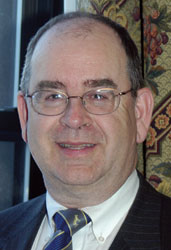
Claire Duggan
|
| |
|
Paddock Named Environmental Dean
In March, Dean Frederick M. Lawrence announced
that Lee Paddock will join GW Law this summer
as associate dean for environmental studies.
Paddock is director of environmental legal
studies at Pace Law School. He also consults
for the Tellus Institute and the Environmental
Integrity Project. Prior to joining Pace,
Paddock was a senior consultant to the National
Academy of Public Administration and worked
on environmental justice, Clean Air Act,
and enforcement issues. He also held a visiting
scholar position at the Environmental Law
Institute and worked with the U.S. Environmental
Protection Agency on innovation issues,
including its Performance Track program.
From 1978 until 1999 Paddock was an assistant
attorney general with the Minnesota Attorney
General’s Office, where he served
as director of environmental policy for
13 years, as manager of the office’s
agriculture and natural resources division,
and as a member of its executive committee.
He has served on numerous national panels,
including the Aspen Institute’s Series
on Environment in the 21st Century and the
American National Standard Institute’s
ISO 14000 Environmental Management Systems
Council.
Paddock served as a law clerk to Judge
Donald Lay of the U.S. 8th Circuit Court
of Appeals.
Paddock also is on the board of the National
Association of Environmental Law Societies. |
Research Team Says
“Social Contract” Needed to Combat
AIDS
A GW research team that studied the AIDS epidemic
in Sub-Saharan Africa says wealthy countries and
corporations have an ethical responsibility to
help combat the deadly virus.
The report, released in February by the Law
School’s Creative and Innovative Economy
Center, outlines 11 critical steps to building
a “social contract” needed for a sustained
and organized intervention.
“The burden of this crisis needs to be
shared by all of the stakeholders,” says
CIEC Director Michael P. Ryan.
Ryan and his team carried out field research
in Burkina Faso, Botswana, and Uganda to examine
how access and treatment programs, specifically
the AIDS slowing antiretroviral drugs, are delivered.
Nearly 26 million people in Sub-Saharan Africa
are HIV positive.
“AIDS activists declare that the drug
companies must take immediate action to stem the
crisis,” Ryan says. “But drug company
leaders assert that African governments are responsible
for the health of their peoples. This report asks
who is responsible to do what and why regarding
antiretroviral drug innovation and access in Africa.”
To combat the crisis and avoid an overall pandemic,
Ryan and his team recommend that specific responsibilities
be laid out. Among their suggestions, the team
says that wealthy countries should
invest in basic medical science in African countries,
African governments should provide patent rights
to encourage private drug development, and The
World Health Organization should ensure that all
ARV suppliers meet good manufacturing practices.
The team also says that ARV drug innovators should
license production to developing country manufacturers,
donate and discount drugs, and teach about drug
distribution and logic.
The entire 11 recommendations and the full report
of The AIDS Social Contract in Africa
are available online at the CIEC’s Web site,
www.law.gwu.edu/ciec.
“There are no quick fixes to this health
crisis,” Ryan warns. “Each government
must articulate comprehensive strategies and recruit
partners with know-how and financial resources
who are committed to sustaining programs over
many years.”

Showing Their Service
Pride
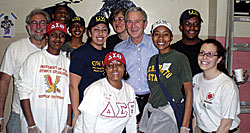 Photo Courtesy of Nicole Alfred
Photo Courtesy of Nicole Alfred
|

|
Alumni Will Wilder, JD ’06, Shani Gholston,
JD ’06, and Joe Hardy, JD ’06, (back
row in blue GW hats) join other volunteers and
President George W. Bush, who is flanked by GW
Law 2Ls Nicole Alfred and Adrienne Lawrence, at
City Year D.C.’s annual MLK Day Service
Project. The event was held this year at Cardozo
High School in January. During the day of service,
more than 500 volunteers assisted in completing
59 mural and other painting projects at the D.C.
school.

Bazos Receives Roger
Boyd Scholar Award

|
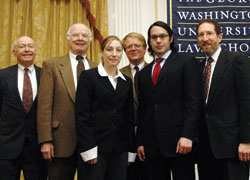
Claire
Duggan
|
Professor Emeritus Frederick J. Lees; Professor
Emeritus Ralph C. Nash Jr.; Adelicia Cliffe Taylor,
JD ’06; Professor Christopher Yukins; and
Senior Associate Dean Steven L. Schooner present
3L Peter Bazos with the Roger Boyd Scholar Award
during the annual Government Contracts Luncheon,
held at the Omni Shoreham in February. The scholarship
is named in honor of late Crowell and Moring Partner
Roger Boyd, who passed away in 2003. It provides
a stipend to the editor-in-chief of the Public
Contract Law Journal. Taylor was the 2006 recipient.
Frederick
Douglass Awards Gala
|
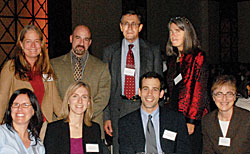
Claire Duggan
|
For the second year, benefactors of the
Southern Center for Human Rights invited
GW Law students and faculty members to attend
the annual Frederick Douglass Awards Gala
in Washington, D.C. Back row, from left:
Professor Anne K. Olesen; Jonathan Rapping,
JD ’95; Douglas G. Robinson, JD ’69;
and Professor Jennifer P. Lyman. Front row,
from left: Brenda Huneycutt, JD ’06;
3L student Sarah H. Kimberly, 2L student
Morgan Macdonald; and Associate Dean Susan
Karamanian.
Guests at the gala heard from attorneys
being honored for post-Katrina work and
the fight against lethal injection.
Rapping, who currently works in the New
Orleans Public Defenders Office, was recently
awarded the U.S. Justice Fund’s 2007
Soros Justice Fellowship to develop the
Southern Public Defender Training Center
at the Southern Center for Human Rights.
The program will train public defenders
across the southeastern United States to
represent indigent defendants in a more
responsive and effective way. |

Human Rights Clinic
Supports ex-Peruvian Leader’s Extradition
The GW Law International Human Rights Clinic
is supporting the extradition of a former South
American leader wanted for human rights violations.
The clinic recently submitted an amicus curiae
brief to the Chilean Supreme Court to request
that former Peruvian President Alberto Fujimori
be returned to Peru, where he is facing corruption
charges and indictments for serious human rights
violations. The brief, written on behalf of 20
U.S. law professors, is in formal support to Peru’s
2005 extradition request.
Fujimori is believed to be behind two killings
by paramilitary death squads in the early 1990s
in Peru, including the gunning down of 15 people
in the Barrios Altos massacre, and the kidnapping
and murder of nine students and a professor at
La Cantuta University.
“The idea behind the brief was to contribute
an international law perspective on ex-President
Fujimori’s liability for international crimes
and serious human rights violations,” says
Arturo Carrillo, GW Law professor and director
of the clinic. “We wanted to make sure that
the Court took into account its international
duty to ensure that Fujimori be brought to justice
for his crimes.”
The amicus brief is an expert submission that
focuses on the international law dimensions of
the extradition proceedings, especially Chile’s
obligations under international criminal and human
rights law. It concludes that to honor its international
legal commitments, Chile must extradite Fujimori
to Peru so that he may face the criminal charges
pending against him. The brief was prepared by
Thomas Antkowiak, a visiting scholar at GW Law
School and IHR Clinic supervising attorney, with
student input and support.


|
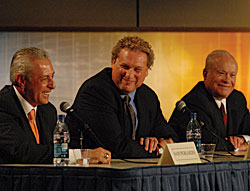
Jessica McConnell
|
Triple Play
GW Law alumnus and Washington Nationals owner
Ted Lerner, AA ’48, LLB ’50, (right)
joins Baltimore Orioles Manager Sam Perlozzo,
BS ’73, (left) and New York Yankees President
Randy Levine, BA ’77, (center) during a
January forum at GW on the future of baseball.
The three GW graduates also were inducted as the
first members of the GW School of Business Sports
Executives Hall of Fame. The trio discussed issues
such as escalating free-agent salaries in front
of a standing-room-only crowd in GW’s Jack
Morton Auditorium.

GW Grads Popular Among
Big Firms
GW’s Law School ranked among the top 20
schools most often tapped by big law firms in
2006, according to The National Law Journal.
About 39 percent of the 626 GW students who earned
JDs last year were hired at these big firms, which
range in size from 172 attorneys to 3,535 attorneys,
The National Law Journal reports. GW
was ranked number 17 in the poll. Columbia Law
School and University of Pennsylvania were first
and second, respectively.

Lawyers Have Heart
10K Run / 3K Fun Walk
Date: Saturday, June 9, 2007
Join the GW Law School Team of students, alumni,
and faculty and staff members for this Washington,
D.C., event benefiting the American Heart Association.
Participants will be invited to take part in a
pasta dinner the week preceding the race and receive
a GW Law Team T-shirt!
Walk or Run: To participate
as a walker or runner (volunteers see below) please
visit active.com,
click on “Register Now” and choose
the “Team Registration” option. Select
“The George Washington University Law School”
from the list. Registration is $30.Participants
will be invited to the Pre-Race Pasta Dinner and
will receive a GW Law Team T-shirt.
Race Day Volunteers: There is
no registration fee for volunteers. To register
as a team volunteer please contact mdevine@law.gwu.edu
or 202-994-7862.
For more information about the race, please visit
http://www.runlhh.org/.
For information about the GW Law Team, please
contact Maureen Devine at mdevine@law.gwu.edu
or 202-994-7862.

GW hosts “San
Francisco on the Potomac”
Reception brings together faculty, friends during
national law convention
GW co-hosted a reception with Georgetown University
for faculty members and friends following the
annual Association of American Law Schools Convention
in Washington, D.C. The January event, which focused
on “Expanding Knowledge and Serving Our
Communities,” drew law faculty from around
the country and gave GW a chance to showcase its
newest Law School additions. Visitors toured the
expanded Lisner Hall, including the new student
conference center, and were able to view the school’s
rare book room. The convention was scheduled to
take place in San Francisco but was moved to Washington,
D.C., because of labor difficulties at the Bay
Area’s major convention hotels. So as not
to disappoint those looking forward to the West
Coast trip, GW created the theme of “San
Francisco on the Potomac,” with some of
the city’s most famous landmarks replicated
around the Law School. Guests noshed on Chinese
food near the Chinatown Gate, Italian treats near
Coit Tower, and Mexican dishes near the Mission
Dolores. Nearly 1,000 full-time and adjunct faculty
members of the two law schools were invited.
|